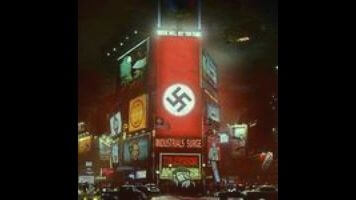It’s a new era on The Man In The High Castle, in more ways than one. Per all reports, this is the first episode of the post-Frank Spotnitz regime, with the original showrunner replaced by no one in particular for the rest of this season. Within the world of the show, the winds of change are blowing as the ‘60s get underway in earnest. In one reality, these are the ‘60s we remember, the time of the Cuban Missile Crisis and “ban the bomb” rallies. In the show’s primary timeline, that revolutionary spirit finds its means of expression in a very different context.
Let’s start with the latter development, which provides not only a clickbait headline for this review, but that true rarity, an interesting outing for Joe. His decision to stay in Berlin has less to do with his father’s wishes than with Nicole, who admits she was working on the Reichminister’s behalf in persuading Joe to stay. They share a common background, as Nicole is also a product of the breeding house, although she assures Joe they aren’t siblings. She takes hm to a house party, where postwar decadence runs rampant.
It makes sense. If you take the Nazi victory to its logical conclusion, you have the German children of the war coming of age in the same period as the Boomers of our reality. The extent of their rebelliousness against the parents’ generation isn’t revealed here, as the only political talk revolves around environmental issues. Socially, they’re already on par with the Haight-Ashbury hippies of the later ‘60s, with free love and LSD tops on the menu. The straight-laced character who takes an acid trip is a staple of any ‘60s-set series (though none will likely ever top Roger Sterling’s experimentation on Mad Men), so it doesn’t come as much of a shock when Joe decides to partake. The hallucinatory effects include the animal heads on the cabin walls coming to life while a prestige drama-mandated orgy breaks out around him, but Joe is most shaken when Juliana (actually Nicole) appears to tell him she’s alive.
This episode includes three different Julianas, if you count Joe’s hallucination as one. Juliana-Prime is reluctantly insinuating herself with the Smiths and their friends, including Helen’s bridge partners. The card game comes with some repulsively casual Master Race chatter about “genetic hygiene” and the Japanese states’ lax standards when it comes to Semitic screening. Juliana makes one new friend in particular, Lucy (Emily Holmes), who spills a drink on her and then takes her shopping for a new dress. Lucy has her own sad tale of being unable to conceive a baby after three years of trying, which leads to Juliana feeling even more conflicted about her undercover work for the Resistance. Truly, though, I’m nauseated by this whole “Nazis are people with feelings, too” arc and hope Juliana snaps out of it soon.
The third iteration of this character is the alt-Juliana in the timeline Tagomi continues to explore. His son Nori is hosting a meeting at the house consisting of college-age beatniks making protest signs and listening to Bob Dylan. Tagomi continues to haunt the house like the ghost he sort of is, hoping to make amends for things he never did and still doesn’t really understand. Nori wants no part of it; he doesn’t want Tagomi anywhere near his grandson and urges him to give his wife the divorce she seeks and move on. Coming clean might be Tagomi’s best course of action, but who would believe him, unless he has the power to bring people with him when moving between worlds?
Back in the New York of the prime universe, John Smith has a plan for saving his son. Thomas has been selected to go on a Nazi mission to South America, something Helen is firmly against on the grounds that his illness will be discovered. Smith has it worked out, however: a kidnapping will be staged, and Thomas will be spirited away into hiding for the rest of his life. The episode closes with a montage accompanied by JFK’s speech to the nation during the Cuban Missile Crisis, cementing the idea that, in whatever reality, The Man In The High Castle is entering a new phase, both onscreen and behind the scenes. It’s an exciting time, but it’s also fraught with peril.
Stray observations
- Juliana’s definition of kintsugi is close enough. The literal translation is “golden joinery,” referring to the art of repairing broken pottery. That’s what Wikipedia tells me, anyway.
- No Frink this week; in fact, there’s not much of the San Francisco-based storyline at all, aside from two separate inspections of the burned-out remains of the High Castle.
- Someone on the writing staff remembered Trudy saying that she’d found “a way out” back in the very first episode. Will that finally lead somewhere after all? Stay tuned.

